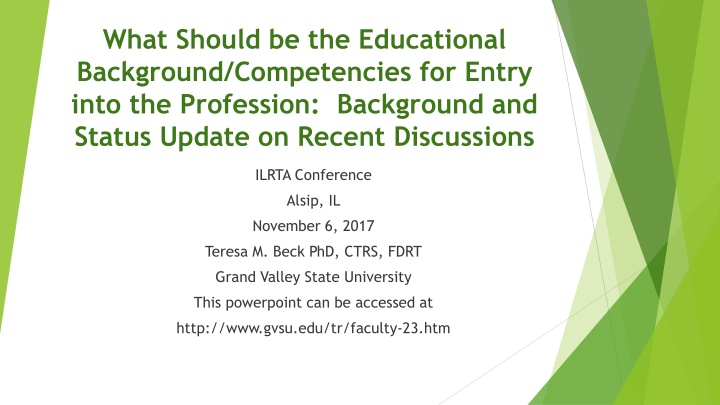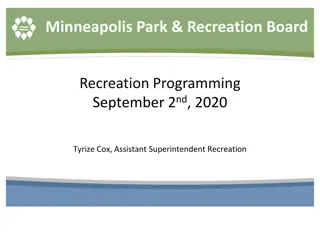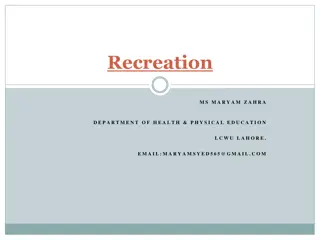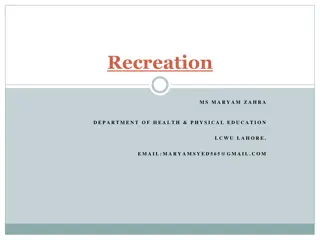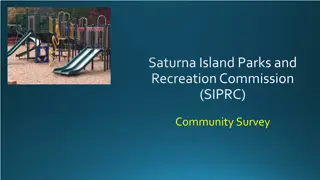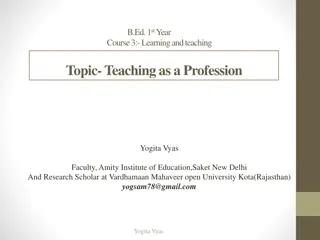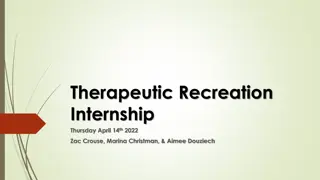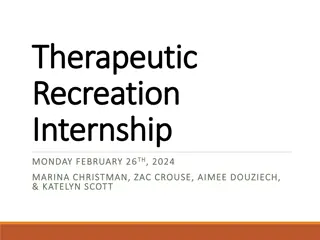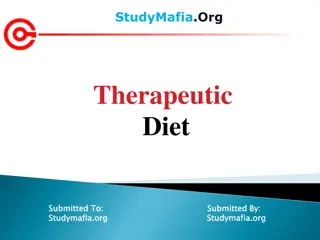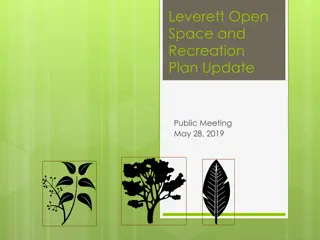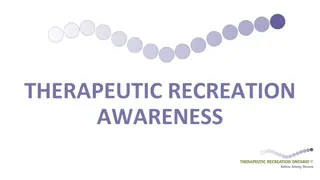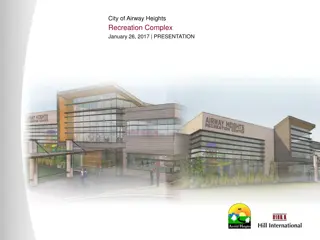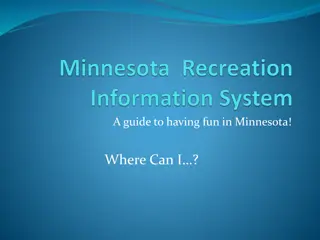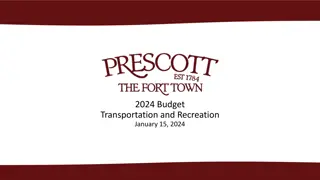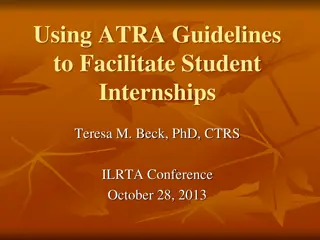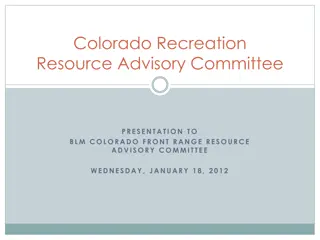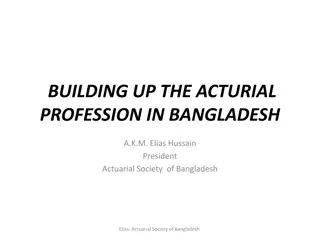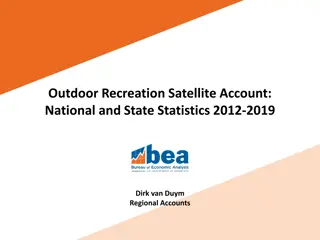Evolution of Educational Background for Entry into the Therapeutic Recreation Profession
This presentation by Teresa M. Beck provides an overview of the historical progression in educational requirements for entry-level professionals in therapeutic recreation. It delves into the shift from bachelor's to master's degree programs, challenges and advantages of pursuing a master's degree, and the current status of graduate education in the field. Key topics include the development of master's programs, the purpose of master's degrees, and the educational content required for entry-level therapists.
Download Presentation

Please find below an Image/Link to download the presentation.
The content on the website is provided AS IS for your information and personal use only. It may not be sold, licensed, or shared on other websites without obtaining consent from the author.If you encounter any issues during the download, it is possible that the publisher has removed the file from their server.
You are allowed to download the files provided on this website for personal or commercial use, subject to the condition that they are used lawfully. All files are the property of their respective owners.
The content on the website is provided AS IS for your information and personal use only. It may not be sold, licensed, or shared on other websites without obtaining consent from the author.
E N D
Presentation Transcript
What Should be the Educational Background/Competencies for Entry into the Profession: Background and Status Update on Recent Discussions ILRTA Conference Alsip, IL November 6, 2017 Teresa M. Beck PhD, CTRS, FDRT Grand Valley State University This powerpoint can be accessed at http://www.gvsu.edu/tr/faculty-23.htm
Session Objectives Describe early efforts of graduate education in the profession Compare and contrast current graduate and undergraduate preparation Differentiate between degree creep and maturation of a profession as it pertains to graduate education Identify 3 challenges and 3 advantages for pursuing a master s degree as entry level Identify the status of the ATRA Higher Education Task Force
Masters Preparation - History First master s program reported in 1951 Universities of West Virginia and Minnesota 1970 s reports note little differentiation among bachelor s and master s programs Highest number of master s program s was 58 in 1980 (Anderson and Stewart study) 2013 study identifies24 master s programs (Stumbo, Carter, Wilder, & Greenwood) Highest number of master s students was reported as 947 in 1980 (Anderson and Steward); in 2010 study reported 164 students (Autry, Anderson, & Sklar) Carter, M.J., Ashton, C., Hutchins, D. & Wolfe, B.D. (2017). Move to master s degree for entry-level practice? In N.J. Stumbo, B.D. Wolfe, & S. Pegg (Eds.), Professional issues in therapeutic recreation: On competence and outcomes (3rd ed.) 173-196. Urbana, IL: Sagamore Venture
Masters Preparation History continued Total number of hours for Master s degree has remained unchanged, but the number of RT required courses increased from 3 (Connolly, 1979) with 11.9 in 2007 (Stumbo, Carter, & Folkerth, 2007) Most common course offerings was the option/emphasis/sequence as opposed to a degree in TR/RT, but recently in 2016, ATRA Higher Education Task Force identified 20 institutions offering Master s degrees with 15 of them listed as TR or RT rather than concentrations Purpose of Master s Degrees was preparation of entry level practitioners, advanced clinicians, and preparation of administrators (Ashton-Shaeffer, Kunstler, Skalko, & Voelkl, 2006) Second study in 2007 indicated majority said the purposed was entry level preparation with a minority reporting advanced clinicians. Carter, M.J., Ashton, C., Hutchins, D. & Wolfe, B.D. (2017). Move to master s degree for entry-level practice? In N.J. Stumbo, B.D. Wolfe, & S. Pegg (Eds.), Professional issues in therapeutic recreation: On competence and outcomes (3rd ed.) 173-196. Urbana, IL: Sagamore Venture
Undergraduate Preparation Educational Content Educational Requirements NCTRC NCTRC 69 Job Tasks for Entry Level Therapists 5 Courses with TR in the Title 57 Knowledge Areas Anatomy and Physiology Abnormal Psychology Human Growth and Development 560 Hour Internship
Undergraduate Preparation CARTE Accreditation Programs Accredited 85 standards for RT knowledge and skill competencies, plus 560 hour internship Western Carolina University Eastern Carolina University Temple University Supportive Coursework Slippery Rock University Anatomy and Physiology University of New Hampshire Developmental, Abnormal, and Cognitive Psychology Oklahoma State University Kinesiology; Biomechanics Disabling Conditions
Undergraduate Preparation COAPRT Accreditation Programs Accredited 4 Standards with additional standards in the area of History and Foundations, Design and Execution of TR Services, Managing TR Services, and Internship 22 programs have an accredited option in TR/RT Meet NCTRC s standards as well for content, supportive coursework, and internship Focuses on evidence of student learning outcomes
Undergraduate Preparation Undergraduate degrees are restricted by many factors: Typically a total of 120 credit hours Basic skills Writing and Math General education requirements Core coursework (emphasis in a degree program, ie general recreation core, business, public health) BS or BA degree requirements Additional writing skills requirements University or state required coursework (diversity, world perspectives, religion)
Change in the Workforce What workforce changes are anticipated in the next three to five years (2015- 2017)? The greatest changes HR professional expect are an increased number of jobs with specific technical requirements (60%), increased staff size (55%), higher education level requirements for most jobs (50%) and increased employee diversity (49%). How will education needs in the workforce change over the next three to five years? More than one-half (55%) of HR professionals anticipate increased demand for candidates with a bachelor's degree, and 41% expect increased need for advanced degrees (e.g., master's, MBA, Ph.D., M.D., J.D.). Changing Employee Skills and Education Requirements Changes in the Workforce. (10/3/2012). Society for Human Resource Management. Retrieved from http://www.shrm.org/research/surveyfindings/articles/pages/shrm-achieve-future-changes- workforce.aspx
Change in the Workforce The bachelor s degree is no longer the coin of the realm it once was. Thirty years ago, it distinguished you in the marketplace. That s no longer so. Phillip Trella Assistant Vice-President for Graduate Studies at the University of Virginia (Washington Post, February 19, 2012) Today, 2 in 25 people age 25 and older have a master s degree as their highest degree about the same number with a bachelor s in 1967. Digest of Education Statistics (as cited in Simon, C. C. [Feb. 19, 2012]. Education Review: More students getting graduate degrees. The Washington Post.)
Whos What? Physical Therapy Clinical Doctorate/DPT Audiology Clinical Doctorate Pharmacology Clinical Doctorate Occupational Therapy Master s with move to Clinical Doctorate by 2027 Speech/Language Pathology Master s Art Therapy Master s Child Life Master s Degree by 2022 Music Therapy Bachelor level, but has a white paper exploring master s level Occupational Therapy Assistant Associate s level with move to Bachelor s by 2027 (has been put on hold) Nursing All levels of degrees discussion to move minimal credential from an associate s to a bachelor s Respiratory Therapy Associate level (with Bachelor programs available) Radiation Therapy/Sonography Associate level (with Bachelor programs available
Is it Credential Creep? Credential creep is requiring a higher degree (or credential) than what is needed to enter the profession. Healthcare professions argue that an advanced degree is needed to deal with the rapid growth of knowledge and builds a more mature professional who relates better to the complexities of the therapeutic process. Additionally, advanced degrees allow the graduate to be able to carry out clinical research and assume leadership roles in their professions and advance public policy. Advanced degrees would prepare graduates to reason through problems analytically and professionally. Advanced degrees would prepare graduates better for patient care and collaborative practice with other health care professionals. Garvin, K. (January 14, 2013). Degree creep and the cost of health care education. Huffington Post. Retrieved from: http://www.huffingtonpost.com/kathleen-garvin/degree-creep-and-the-cost_b_2130347.html Kreimer, S. (March 21, 2006). Requirements creep higher in health fields. Knight Ridder Tribune News Service
What the Critics Say Advanced degrees are degree/credential creep. Advanced degrees may exacerbate the shortage of health care workers. Increased cost and time may exacerbate health care disparities in our society few healthcare professionals come from minority populations increased education requirements could further reduce minority populations. It is the profession who needs to command respect and recognition, not the degree. Healthcare facilities are reimbursed for clinical services, not according to the degrees held by their clinicians. Siler, W.L. & Randolph, D.S. (July 21, 2006). A Clinical Look at Clinical Doctorates. The Chronicle of Higher Education
Difference Between Maturation and Degree Creep Maturation occurs because the scope of a field advances and proper patient care requires additional education and acquisition of new skill sets. Degree creep occurs because of factors external to the quality of patient care. It occurs in spite of a lack of supportive data. Recognition Increased salaries Perceived increased educational and skill requirements of the profession Perceived increased access for patients Increased reimbursement Ashford, E. (August 10. 2011). Colleges worry about degree creep in health care. Community College Daily American Association of Community College. Retrieved from: http://www.ccdaily.com/Pages/Academic- Programs/Community-colleges-concerned-about-degree-creep-.aspx Loochtan, A. (2011). Creepy take 2 Consequences of degree creep in health professions. NN2 Annual Meeting 2011, Cheyenne, Wyoming. Retrieved from: http://www.nn2.org/images/DegreeCreep.pdf
Entry Level Masters in TR Degree Creep or Maturation? Is a master s degree needed as entry level to TR in order to receive: Recognition Increased salaries Increased access for patients Increased reimbursement OR Is a master s degree as entry level to the profession needed because the scope of a field advances and proper patient care requires additional education and acquisition of new skill sets?
Question? Can therapeutic recreation students truly be competent entry level practitioners with a BS/BA that includes only 5 TR/RT courses and an internship of 560 hours? Can therapeutic recreation educators teach minimal competency of all the content from the NCTRC Job Analysis, CARTE and COAPRT Accreditation Standards in 5 TR/RT courses? Is the bachelor prepared recreational therapy professional prepared to collaborate with the interdisciplinary team with 5 TR courses compared to 12-18 discipline specific courses and a Master s Degree taken by OT, PT and SLP?
Do the Current Masters Degree Programs Meet the Necessary Academic Rigor to Consider Advanced Degree Entry? Master s Degrees in RT/TR Emphasis in another degree program
Trends in Masters Degrees Stand alone TR Programs Undergraduate in TR No Undergraduate in TR 30 Credits 36 + credits depending upon coursework for NCTRC and 2 undergraduate TR courses Research Course 3 credits TR Coursework 15 credits Research Course 3 credits Concentration area 9 credits TR Coursework 17 credits Project/Thesis 3 credits Concentration area 9 credits Practicum 4 credits Project/Thesis 3 credits
Trends in Masters Degrees Emphasis or Track Undergraduate in TR No Undergraduate in TR 36 + Credits; Additional coursework as needed for NCTRC; undergraduate TR courses as needed 30 36 Credits Statistics 3 Credits Research 3 Credits Statistics 3 credits TR Coursework 15 credits Research 3 credits Recreation Coursework 6/9 credits TR Coursework 15 Credits Recreation Coursework 6/9 credits OR OR Combined General Recreation/TR coursework 6-12 credits Combine General Recreation/TR coursework 6-12 credits Thesis 3 credits Internship 3 credits
Credit Hours for Entry Level Masters Degrees Profession Minimum Credit Hours 60 48 60 Source Addictions Counseling Art Therapy Clinical Mental Health Counseling CACREP Standards American Art Therapy CACREP Dance/Movement Therapy 60 American Dance Therapy Association CACREP Standards Marriage, Couple, and Family Therapy School Counseling 60 48 CACREP OT and SLP do not have requirements for credits However, many OT programs are 2 2 years and SLP states that the achievement of knowledge and skills outcomes typically require the completion of 2 years of graduate education Master s Level Entry: Moving Forward. American Music Therapy Association. Retrieved from: http://www.musictherapy.org/assets/1/7/Masters_Entry-Moving_Forward.pdf
What if Following One OT Model Students completed a Bachelor s Degree in anything Psychology, Sociology, Criminal Justice, Anthropology, Allied Health Science, Exercise Physiology, Biology etc. Prior to applying to the entry level Master s Degree, they must have completed: Anatomy and Physiology Abnormal and Developmental Psychology Statistics Research Could also consider Cognitive Psychology, Kinesiology, Exercise Physiology as pre- requisite courses This leaves 60 hours of TR Education (including graduate level research coursework)
What Could 60 Hours of Entry Level Graduate TR Coursework Look Like? Course Credit Hours 30 - 33 9 3 3 3 - 9 3 3-7 6 TR Content Specialty Certification Coursework Public Policy Grant Writing Graduate Research Graduate Statistics Thesis/Project Internship
What about a 2 Tier System Undergraduate Degree in RT/TR or General Recreation with emphasis in TR/RT Resurrect the CTRA (Certified Therapeutic Recreation Assistant) Bachelor degree students sit the CTRA exam Meet NCTRC support coursework (Anatomy and Physiology, Psychology etc.) Master s Degree Undergrad degree in TR/RT or general recreation with an emphasis in TR/RT Advanced TR coursework Master s Degree students take the CTRS exam
How to Move Towards Masters Degree as Entry Level The implementation of a decision to move towards a master s degree does not happen overnight It is a process that implemented over a time span This is similar to NCTRC giving 5 years for a new standard to be implemented Implementation of a master s degree as entry level is typically a 10 year process Child Life has decided to move toward a master s degree as entry level and is using a 10 year process Persons who are practicing with a bachelor s degree are usually grandfathered in and do not have to get a master s degree
Child Life as an Example Year 2013 Change Task Force 2020 concludes charge and a Graduate Program Accreditation Task Force is struck. Undergraduate Endorsement Reviewer Task Force is formed. Undergraduate Program Endorsement launches. Graduate Program Accreditation launches. Last Certification Exam where academic preparation at the bachelor s degree level meets certification eligibility requirements. All new Certified Child Life Specialists must hold either a Master's in Child Life or a Master's degree with a concentration or emphasis in child life from an academic program that has been accredited by CLC; these students must successfully pass the certification exam by Fall 2024. All new Certified Child Life Specialists must hold a master s degree in child life (or international equivalent) from an academic program that has been accredited by CLC. 2014 2015 2018 2021 2022 2025 http://www.childlife.org/Certification/AdvancedDegree2022/index.cfm
Challenges in Moving Towards a Masters Degree Doctoral prepared faculty to teach at the master s level Grandfather clause University support for offering a master s degree Concern that bachelor level therapist may lose jobs to master prepared therapists Financial concerns ATRA, NCTRC Impact on programmatic accreditation (CARTE) Financial concerns of the university Curricular processes through universities Concern with potential loss of enrollment for a master s degree
Thoughts on the Challenges There is no reason to reinvent the wheel this process has been successfully completed by other professions, which provides direction. In most cases, universities make money on graduate programs because of higher tuition rate. Enrollment may drop, this is common with a major curriculum change, but enrollment will recover. This is an option for students who want a health and wellness profession but OT, SLP or the DPT do not fit their professional desires just as the undergraduate degree in TR is discovered by students who for some reason decide not to pursue OT, SLP and PT. Additional certification bodies will recognize the RT degree as a qualified degree to pursue their specific certification. We are a grass roots profession with strong leaders who can make it happen
Outcomes of Moving Towards a Masters More competent and skilled graduates offering RT services to its constituents Increase in evidence based research Increase in the use of evidence based research to provide interventions Increase in specialty certification More mature graduates Increase in the number of persons interested in completing a doctoral degree and entering higher education thus impacting faculty shortage
Because of More Skilled Graduates/ Practitioners Increased recognition Increased salaries Increased access for patients Increased reimbursement Positive impact on state licensure
Current Status of Work in this Area 2015 2016 Online survey Sent to TR educators (170 TR faculty from 82 colleges and universities) Responses showed that faculty were almost equally split between whether the profession should move to master s degree as entry level (including faculty at institutions that offered master s degrees) Reasons for or against master s as entry level followed the same conversations as presented earlier in this presentation. If the program moved to a master s degree, different curriculum models offered but most prevalent was the 3-2 or 4-1 (undergraduate TR major would earn a BS and MS in 5 years) ATRA Higher Education Task Force conducting research and focus groups to gather information to make recommendation to ATRA Board of Directors on what would constitute entry level into the profession of TR
Concluding Thoughts We are at a crossroads in our professional development As a profession we can choose to be proactive or reactive Crossroads call for leadership and courage, both on its leaders and its general membership A proactive choice often requires substantial changes the changes may be difficult for a profession, because they demand the profession to grow The process of growth challenges the ways we think about ourselves and our profession Substantial changes entail risk and can also reap rewards
Questions to Ponder Is the BS Degree enough education for entry level practice? Should the profession move to a master s degree? If yes, how does the master s degree differ then from a bachelor s degree as entry level If no, what needs to be done to fix the undergraduate degree What role does program accreditation play in curriculum development What role does education play in the attainment of licensure
Other Resources Bollag, B. (June 22, 2007). Credential Creep. The Chronicle of Higher Education Compton, D. V. (2010). The evolution of education in therapeutic recreation. Therapeutic Recreation Journal, 44(3), 157-159. Master s Level Entry: Core Considerations. American Music Therapy Association http://www.musictherapy.org/assets/1/7/Masters_Level_Entry_Core_Considerations.pdf Simon, C.C. (Feb. 19, 2012). Education Review: More Students Getting Graduate Degrees. Washington Post
